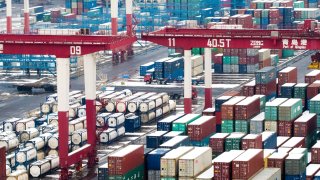
- The country's customs agency said Tuesday that in dollar terms, exports rose 30.6% in March from a year ago, missing expectations for growth of 35.5%.
- Looking ahead to the next three months, customs spokesperson Li Kuiwen told reporters that last year's high base poses challenges for trade in the second quarter.
- China's early emergence from the pandemic and stimulus overseas have driven purchases of products made by Chinese factories, two factors that will fade away later this year, said Larry Hu, chief China economist at Macquarie.
BEIJING — China's economy was buoyed by strong exports last year, but that boost is waning.
The country's customs agency said Tuesday that in dollar terms, exports rose 30.6% in March from a year ago, missing expectations for growth of 35.5%.
Looking ahead to the next three months, customs spokesperson Li Kuiwen told reporters that last year's high base poses challenges for trade in the second quarter. In addition, Li said the resurgence of Covid-19 cases and overseas uncertainties — such as the Suez Canal blockage — mean China still has a long way to go in achieving stable growth in trade.
Get San Diego local news, weather forecasts, sports and lifestyle stories to your inbox. Sign up for NBC San Diego newsletters.
Chinese authorities would like to shift the economy's reliance to private consumption for growth, and away from manufacturing of goods for export. But the category still plays a significant role in the overall economy. Last year, Chinese factories were able to resume production far earlier that those in other countries still struggling with the pandemic.
National exports rose 3.6% last year, while the country's GDP grew 2.3% as the only major economy to expand amid the pandemic. Much of the exports growth last year came from a surge in demand for face masks and other protective gear.
Money Report
China's early emergence from the pandemic and stimulus overseas have driven purchases of products made by Chinese factories, noted Larry Hu, chief China economist at Macquarie.
"These two factors (will) both fade away in the rest of this year as other countries reopen and consumers are able to spend more on services," he said in an email Tuesday. "Therefore, I don't think the current pace could sustain."
March's 30.6% increase in exports comes off a low base. China's exports fell by 13.6% in the first quarter of last year amid a GDP contraction of 6.8%, according to data accessed through Wind Information.
Nomura analysts expect export growth to decline to 10% to 15% in April, with a more significant slowdown in the second half of the year.
International e-commerce
In another sign of limits to trade's ability to contribute to national growth, cross-border e-commerce between China and other countries showed muted performance in the first quarter.
The new, internet-driven trend contributed 419.5 billion yuan ($64.5 billion) to trade in the first three months of the year. That marked just under 5% of China's trade during that time — little changed from the ratio of nearly 5.3% for all of last year.
While the first quarter figures marked 46.5% growth from a subdued base a year ago, the value of cross-border e-commerce trade in the first three months of the year was below last year's quarterly average of 422.5 billion yuan.
"The proportion of cross-border e-commerce remains low, (showing) the limits it has on contributing to imports and exports and the economy as a whole," said Bruce Pang, head of macro and strategy research at China Renaissance. That's according to a CNBC translation of his Chinese-language statement.
He expects Chinese authorities will focus on expanding domestic demand and the local market, as a way to hedge against potential fluctuations in foreign trade.
Imports rose a greater-than-expected 38.1% in March.
China is set to release first-quarter GDP figures on Friday. Data for January and February are typically distorted by the Spring Festival, the country's biggest holiday of the year.






